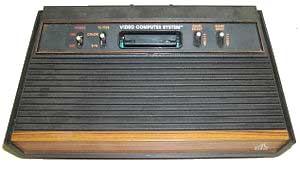I had a high-tech CEO ask me the loaded question to end all loaded questions the other day. What makes a technology company succeed?
It’s almost impossible to come up with a single answer, or even a single set of answers. What do Google, Microsoft, YouTube, MySpace, Digg, Mozilla, Adobe, Dell, and Apple have in common? I came up with a number of factors off the top of my head — empowering users, keeping a steady pace of innovation, good PR, making easy-to-use products — but none of them seemed to be the end-all, be-all of high-tech success.
So I decided to look at the question from the opposite angle. What makes a technology company fail? Here are a handful of companies from the past twenty years that strike me as prime examples of organizations who lost a commanding lead and/or market dominance in a particular field due to their own idiocy or incompetence.
 1. Atari. The mass market videogame console was more or less invented by Atari in the late ’70s. Their only real competitor for years was Mattel’s Intellivision, which may have had vast technical superiority but had inept marketing. (George Plimpton? You’ve got to be kidding me.) But instead of innovating, Atari took the road of suing anyone and everyone who touched its much-beloved system. (Activision, Coleco, Starpath, Odyssey, Nintendo, Phillips, and Epyx all suffered Atari’s litigious wrath.) There was also a precipitous drop-off in videogame quality, as anyone who remembers notoriously bad media tie-ins like E.T. The original company was sold off many times and finally diluted to nothingness in the ’90s. The name still had such cachet, however, that Infogrames later licensed it for themselves.
1. Atari. The mass market videogame console was more or less invented by Atari in the late ’70s. Their only real competitor for years was Mattel’s Intellivision, which may have had vast technical superiority but had inept marketing. (George Plimpton? You’ve got to be kidding me.) But instead of innovating, Atari took the road of suing anyone and everyone who touched its much-beloved system. (Activision, Coleco, Starpath, Odyssey, Nintendo, Phillips, and Epyx all suffered Atari’s litigious wrath.) There was also a precipitous drop-off in videogame quality, as anyone who remembers notoriously bad media tie-ins like E.T. The original company was sold off many times and finally diluted to nothingness in the ’90s. The name still had such cachet, however, that Infogrames later licensed it for themselves.
2. Netscape. Netscape partisans and Microsoft haters have long promoted the urban legend that Microsoft drove this company into obscurity. And while Bill Gates & Co.’s anti-competitive practices certainly helped, ultimately the blame lies with the company itself. Netscape was running neck-and-neck with Microsoft in the browser wars for several years until its hideous Navigator 4 browser (which earned the company the Nutscrape label, among many other less complimentary names). Undeterred by their slipping fortunes, the company followed Navigator 4 with… nothing. For years. They pursued a ruinous portal strategy instead and sold out to AOL, who let the company completely die on the vine. Now Netscape is stuck with a dying portal website and an also-ran browser that piggybacks on both Internet Explorer and Firefox.
3. Palm. The early PalmPilots finally found the magic formula that had eluded so many other companies for so long. They were easy to use, integrated tolerably well with your PC, and were extremely reliable machines. No wonder the company built up such a network of software developers. And then a long series of ownership switches threw the platform’s future in the toilet. The result? Microsoft’s Pocket PC platform (now Windows Mobile) overtook the Palm on basic, must-have features (like oh, say, enabling a contact to have both a home and business address, which the Palm still can’t do). I read recently that the Palm OS actually still funnels everything through emulation software for its ancient Dragonball processor, which is a good indicator of how far behind the innovation curve these folks have gotten.